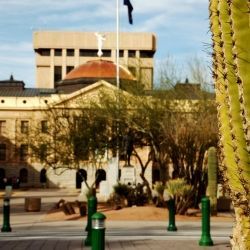May 19, 2025
TOP LINE UPDATE
May 19 is the 127th day of the 2025 legislative session. The State Senate has taken a break from May 7 to May 28, while the State House of Representatives recessed from May 7 to May 20, after sending just over 100 bills to the governor, with a total of 352 so far this year. There is still no clear path forward to a state budget, as the House, Senate and Governor's office remain at odds.
The City of Phoenix is considering a draft ordinance on data centers, with the expedited schedule of a Council vote on the measure by June 18. The draft would require all data centers obtain a special use permit, adds new design, setback, shade and walkability standards and prioritizes placement away from city centers, cores and areas the city has identified as priority for high density and mixed-use.
The Finance Advisory Committee warned of the potential for a recession and argued the legislature should reduce spending. The Joint Legislative Budget Committee (JLBC) has repeatedly lowered their estimated surplus for the state general fund, which only furthers the divide among lawmakers on how to craft the budget. With the April fiscal highlights released, the JLBC noted lower than expected tax collections, increased uncertainty with federal tax, trade and spending policy and overall weaker economic indicators in construction and retail. Lawmakers have until July 1 to pass a state budget.
After Governor Hobbs signed SB 1543, the "Axon bill", the City of Scottsdale voted to approve spending $100,000 in outside legal counsel to review the law. Meanwhile, opponents the development have filed paperwork with the Secretary of State's office to begin collecting signatures to refer the measure to the ballot. If the group gathers enough valid signatures and survives legal challenges, the law - SB 1543 - would be put on hold and placed on the 2026 ballot for voters to keep or repeal.
The governor signed the utility securitization bill - HB 2679 - after significant amendments in the Senate. The bill faced opposition from Senate Democrats and environmental groups. After negotiations with the governor, the bill was amended to require transition assets be currently or previously in operation for the purpose of generating power for customers, add requirements in the application process for securitization and that the assets financed will result in lower costs to the utility customers.
Save the date for a NAIOP lunch and learn on energy policy in Arizona on June 10, from 11:30 AM to 1:00 PM.
STATE LEGISLATURE & POLITICS
As noted above, lawmakers and the governor are no closer on a state budget. The House and Senate leadership are taking different approaches to the underlying budget process, with the Senate having a "member-driven" budget that assigns a specific dollar amount to each lawmaker to spend or pool together, while the House wants a "leadership-driven" budget, which would consist of select group negotiating with the governor and then presenting the resulting deal or proposal to the larger body. With the recess for most of May, it's unlikely that lawmakers have made any progress on negotiations.
Governor Hobbs' nominee to run the Land Department, Robin Sahid, received a full recommendation from the Committee on Director Nominations in the Senate. The chair of the committee spent most of his time questioning Sahid on the canceled land auction in North Phoenix that was expected to house the relocation for the Arizona Coyotes. Sahid said the deal was canceled in part because of the need for a special use permit from the City of Phoenix. Sahid's nominations awaits full Senate confirmation, which is expected after they return from their May 7-28 recess.
The Arizona Department of Water Resources (ADWR) wants the courts to dismiss a lawsuit brough by the Homebuilders Association of Central Arizona. In the motion, ADWR argued the homebuilders association doesn't have standing to file the lawsuit, and that their Groundwater Offset Rule is consistent with state statutes. The homebuilders argue the new rule - which requires homebuilders to obtain a 25% renewable water source - is ultimately a tax, and invalid. No date has been set for a hearing.
The K-12 funding mechanism known as Prop. 123 is set to expire unless lawmakers refer a continuation to the ballot. Passed in 2016, Prop. 123 increased the distribution from the State Land Trust sales from 2.5% to 6.9% to public education over ten years, with more than $3 billion additional dollars going into the system. Without an extension of Prop. 123, roughly $300 million a year in education funding would need to be offset by the state general fund. Republicans are considering a measure that would tie the Prop. 123 extension to the Empowerment Scholarship Account (ESA) program. The strategy would enshrine ESAs in the state constitution and make them voter-protected. Governor Hobbs, legislative Democrats and education groups oppose the combining of the two subjects, but legislative referrals do not require the governor's signature.
LOCAL SPOTLIGHT
The proposed data center ordinance for the City of Phoenix is set to go before the Planning Commission on June 5, and City Council by June 18. The new rules would:
- Restrict data centers away from city cores and ush them away from mixed-use and transit-oriented communities
- Require a permit before locating in industrial or commercial zoned areas
- Require noise mitigation within 300 feet of residential areas and a third party study
- Require a will serve letterer from a utility confirming energy availability within two years
The nonprofit group Worker Power continues to engage in Arizona localities to block major commercial projects. Notable projects they've opposed include the Tempe Entertainment District that would have housed the Arizona Coyotes, the Axon development in Scottsdale and the VAI resort in Glendale.
Tempe is exploring development opportunities as part of the Rio Salado Master Plan. The plan serves as a roadmap for improvements over the next 20 to 30 years and outlines activity zones, programming and amenity opportunities. Read more.
Phoenix acquired an industrial site along 7th Street as part of the effort to revitalize development along the Rio Salado. The site, Rio Reimagined, will involve the cities of Phoenix, Avondale, Buckeye, Mesa, Phoenix and Tempe and the Salt River Pima and Gila River Indian communities. The portion of Phoenix's stretch of Rio Reimagined spans roughly 20 miles and will consist of four phases. Read more.
Tucson announced its third draft of Plan Tucson 2025, which was approved by the Planning Commission unanimously. The City Council will hear public comment and vote on the proposal on May 20. Key components of the plan include affordable housing, transparency and accountability, and administrative flexibility. Live stream the hearing here. Review the plan here.
In response to a 2024 law, Tucson is conducting public meetings to review options to complying with the middle housing legislation. The law requires larger cities to allow middle housing on single family lots within one mile of the downtown core, and that new, larger developments include 20% middle housing. Learn more.
The City of Maricopa voted to adopt a dedicated funding source to widen State Route 347. The sales tax is expected to generate $8 million per year. The City also authorized an intergovernmental agreement with the Arizona Department of Transportation. The next step is for ADOT to adopt the widening of SR 347 in its five-year construction plan.
LEGISLATION WE'RE TRACKING
HB 2679 (power; public utilities; UCC; securities - Rep. Griffin): Allows utilities to initiate securitization transactions and establishes a framework for utilities to adopt financing resolutions, submit proposals and conduct public comment.
NAIOP Position: Support
Status: Signed Into Law
HB 2201 (wildfire mitigation planning; utilities; approval - Rep. Griffin): Establishes legal framework for liability related to wildfires. Utilities are required to submit mitigation plans on a biennial basis and approved by either the Corporation Commission or the utility's board.
NAIOP Position: Support
Status: Signed Into Law
SB 1523 (water use; prohibition; landscaping - Sen. Dunn): Prohibits a municipality from requiring specific number of trees, plants, turf or lot coverage for developments.
NAIOP Position: Support
Status: Awaiting Full Senate
HB 2594 (GRRC; continuation - Rep. Blackman): Continues the Governor's Regulatory Review Council for two years. Modifies the composition of GRRC and the appointment process. Prohibits GRRC from adopting a rule when in study session, and allows any person to petition GRRC to review agency practice, policy or requirement.
NAIOP Position: Monitor
Status: Awaiting Full Senate
IN OTHER NEWS
- Trump impact on AZ: how latest cuts are affecting state
- Congress advances budget and tax bill
- AZ's embattled Democratic chair suspends No. 2
- SRP's new planned reservoir could power 450,000 homes
- Arizona is on the cusp of a clean energy boom - Congress must defend our future
- How Arizona data center construction will explode with AI adoption
- August default looms without debt limit action
- Tempe seeks partners for new attractions along shoreline
- Greer fire burned 9,500 acres
NAIOP Arizona advocates for public policy at all levels of government to help grow the economy and drive demand for commercial real estate in greater Phoenix and throughout Arizona. Email policy@naiopaz.org for questions.








